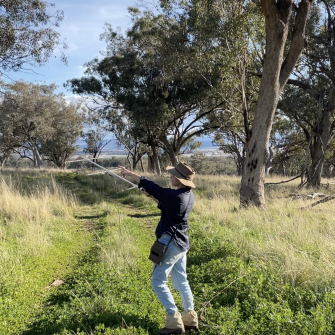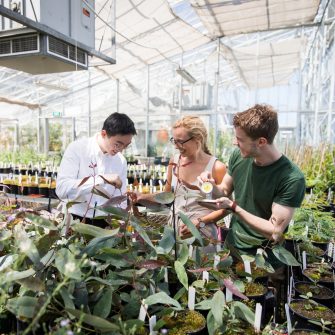Master of Psychology (Clinical)
- Commencing Terms
- Term 1
- Duration
- 2 Year(s)
- Delivery Mode
- Face-to-face (includes blended), Research
- Campus
-
Kensington
- Codes
- Program code 8256
- CRICOS code 001934A
-
Commonwealth Supported Places are available for this program2026 Indicative CSP first year fee
- $13,500*
-
2026 Indicative CSP fee to complete degree
- $24,500*
-
2026 Indicative first year full fee
- $58,500*
-
2026 Indicative full fee to complete degree
- $122,000*

Application closures for 2026
International applications for all undergraduate programs, as well as postgraduate programs offered by the faculties of Arts, Design & Architecture, Engineering (excluding Master of Information Technology and associated programs) and Science are now closed to New Overseas Student Commencement (NOSC) for 2026 intakes.
Postgraduate programs offered by the Business School and the faculties of Law & Justice and Medicine & Health remain open. Master of Information Technology (and associated programs) also remain open.
- Overview
- What will I study?
- Entry requirements
- Future careers
- How to apply
- Fees & Scholarships
- FAQs
Overview of the Master of Psychology (Clinical)
Established in 1971, the Master of Psychology (Clinical) at UNSW is a two-year, APAC-accredited degree that prepares students for professional practice as clinical psychologists, leading to registration as a psychologist with the Psychology Board of Australia (PsyBA) . It forms the 5th and 6th years of the six-year sequence required to become a registered psychologist in Australia. Ranked #2 in Australia and #32 globally for psychology (QS World University Rankings by Subject, 2025), UNSW offers world-class clinical training in both practice and research.
The program covers adult, adolescent and child clinical psychology, equipping students with the skills to assess and treat a wide range of psychological disorders. It also includes training in psychological assessment, treatment planning and neuropsychological rehabilitation. It combines evidence-based coursework, a substantial clinical psychology research thesis and over 1,000 hours of supervised clinical placements. The program follows a scientist-practitioner model with a strong cognitive-behavioural focus, preparing graduates for general registration as psychologists and the pathway to clinical endorsement.
A combined PhD/Master of Psychology (Clinical) postgraduate degree is also available for students seeking to integrate advanced research training with clinical practice.
Why study Clinical Psychology at UNSW?
Study Clinical Psychology with the best
The UNSW School of Psychology is one of the best in Australia. We’re ranked #2 in Australia and #32 globally for psychology (QS World University Rankings by Subject, 2025), attracting award-winning staff and offering excellence and innovation in our teaching. The School of Psychology has strong links with professional practitioners in the areas of clinical, neuropsychological and forensic psychology.
Prepare for professional practice
When undertaking the Master of Clinical Psychology, you’ll begin seeing clients in your first year of study. This program includes a professional practice component, where you’ll complete a minimum of 1,000 supervised practicum hours within the UNSW Psychology Clinic and at least two other field placement settings. Clinical psychology placements involve seeing both adult and child clients for therapy and psychometric assessments. This practical experience will build your confidence as a healthcare professional and expose you to a wide range of client groups and clinical settings, such as adult mental health, psychiatry, medical psychology, child and family and general community health.
Learn from industry-leading educators
You come to university to learn from the experts – researchers who are leaders in their fields, striving to investigate and create new knowledge. The School of Psychology is well known for its research excellence. Many of our staff have international reputations in their respective fields and a number are Fellows of the Australian Academy of Social Sciences. Our staff attract several million dollars in external research funds per year. Our staff publications receive more citations than any other psychology department in Australia and we have one of the highest rates of PhD graduations in psychology of any Australian university. We earn more competitive research funding and publish more Tier 1 journal articles per academic than any other psychology school in Australia.
Access cutting-edge facilities
Our teaching facilities include world-leading behavioural neuroscience laboratories and cognitive testing laboratories running specialist software that will allow you to design/implement your own psychological research and evaluate/interpret the data you collect. You’ll also gain access to laboratories for the analysis of cognition and brain function, including electroencephalography (EEG), transcranial magnetic stimulation (TMS) and eye-tracking.
Want to see more from UNSW Science?
Master of Psychology (Clinical) program structure
UNSW is introducing a new academic calendar from 2028.
We are moving to a new flex-semester calendar. What does this mean for your studies?
The Master of Psychology (Clinical) can be completed in two years of full-time study. Please note that this program of study is very intensive. Professional practice activities are time consuming and not limited to particular hours. It’s not possible to complete the program part-time while working full-time. The program on adult, adolescent and child clinical psychology, neuropsychological assessment and rehabilitation.
Program structure
The program consists of three components, all of which are compulsory, totalling 96 Units of Credit (48 in each stage).
- Coursework - weekly lectures and seminars with associated written forms of assessment (42 UOC)
- Professional Practice - completion of a minimum of 1000 hours of supervised practice in forensic settings, weekly Forensic Psychology meetings, and Skills Training Workshops (36 UOC)
- A Research Thesis (18 UOC).
For more detailed information of the Progression Plan and Program Guide, please refer to our postgraduate coursework page.
Clinical Psychology placements and training
In this part of the training, you’ll complete a minimum total of 1,000 practicum hours in the UNSW Psychology Clinic and in at least two other field placement settings. A range of external field placement options are available including:
- adult mental health
- psychiatry
- consult-liaison
- medical psychology
- developmental disability
- neuropsychology
- child and family
- psychogeriatric
- schools
- general community health settings
Your practicum hours will involve assessing and treating clients under the supervision of clinical staff. This component of the program is designed to develop your technical skills, professionalism and understanding of ethical practices. The following practical courses are offered in this program include:
Clinical Psychology research thesis
This course involves the planning and execution of a research project under the supervision of an academic staff member from the School of Psychology. Projects may focus on any topic relevant to clinical psychology. Candidates are required to produce a thesis in the format of a journal article. The research thesis component is structured as follows:
Research Thesis (18 UOC):
Research Thesis (Clinical) 1 (6 UOC)
Research Thesis (Clinical) 2 (6 UOC)
Research Thesis (Clinical) 3 (6 UOC)
Master of Psychology (Clinical) entry requirements
The minimum academic eligibility requirement is completion of a four-year APAC-accredited sequence in psychology, including a major research thesis/project, with Honours Class 1 (85%), or international equivalent. Qualifications must have been completed within the last 10 years (exceptions may be possible in limited circumstances).
Psychology qualifications from overseas must include a major research thesis/project and must be assessed by the Australian Psychological Society (APS) as equivalent to a four-year APAC-accredited sequence in psychology completed in Australia. Please note you must have your qualification assessed before you apply.
As the number of places available each year is limited, entry into this program is competitive. Selection is based on academic qualifications, two referee reports and performance at an interview. Only shortlisted applicants will be invited to participate in an interview - remote participation may be permitted in limited circumstances.
English language requirements
Applicants must:
- demonstrate their competency in speaking and communicating in English is sufficient to practise the psychology profession
- satisfy both UNSW's English language requirements and those required by the Australian Health Practitioner Regulation Agency (AHPRA)
All applicants, domestic and international, are encouraged to use AHPRA’s pathway selection tool to guide their understanding of AHPRA’s requirements.
Provisional registration
Before starting the Master of Psychology (Clinical) degree, all students must apply for provisional registration with AHPRA's Psychology Board of Australia (PsyBA). Provisional registration with PsyBA is required to begin clinical placements in the first year of the degree.
Inherent requirements
Inherent requirements are the fundamental tasks and activities needed to achieve the core learning outcomes of a course.
Before applying, it's crucial to read and fully understand these inherent requirements and think about whether you may experience challenges in meeting these requirements.
Clinical Psychology career outcomes
Clinical psychology is an ideal career path for people who enjoy working with and caring for others. At UNSW Science, our graduates demonstrate skills in assessment, diagnosis, prevention and treatment of problems at an individual and group level.
Clinical psychologists work in a range of settings including:
- counselling centres
- independent or group practices
- hospitals
- clinics
- rehabilitation
- universities and schools.
The number of available jobs is increasing - each year 4,400 new jobs are projected to be generated.
Accreditation
The program is accredited by the Australian Psychology Accreditation Council (APAC) as a fifth and sixth year of study. Graduates are eligible to apply for full membership of the Australian Psychological Society (APS) and registration as a psychologist with the Psychology Board of Australia (PsyBA).
Graduates are also eligible for Associate Membership of the APS College of Clinical Psychologists. After completing a Psychology Board of Australia approved Clinical Psychology registrar program, graduates will be eligible to apply for APS College of Clinical Psychology Fellowship and endorsement as a Clinical Psychologist.
Combined PhD/Master of Psychology (Clinical) program
We also offer a combined PhD/Master of Psychology (Clinical). This four-year, full-time degree includes a research component as well as coursework and professional placements, making it ideal for students who want to develop advanced research expertise alongside professional clinical training and pursue careers that bridge research and clinical practice.
Our alumni
"I am extremely grateful to have studied the Master of Psychology (Clinical) degree at UNSW. The staff involved in the degree are some of the top academics and clinicians in the field. Learning from people of such high calibre meant that I felt well positioned to begin my journey as a practicing Psychologist once I had graduated. I also really enjoyed the small student to teacher ratio. Throughout the degree this meant that I was able to receive consistent individualised feedback on my work that allowed me to develop my professional identity as a clinician."
Luke Brock
Clinical Psychology Registrar
"Completing the Masters of Clinical Psychology at UNSW allowed me to gain the clinical training, experience and confidence to go out and practice as a psychologist in a wide range of clinical roles. I went on to work in public hospitals, private hospitals and private practice settings. I saw a range of different clients and worked with various health professionals which has shaped me to be the clinician I am today. I now also supervise early career psychologists and have opened up my own private practice. The Masters program was such a strong foundation for me to build everything else on, and I am very thankful for the opportunity to have had that training."
Natasha Herbert
Clinical Psychologist
How to apply for the Master of Psychology (Clinical)
Domestic students: Applications open on 1 August 2025 and close 3pm AEDT, 31 October 2025.
Onshore and offshore international students: Applications are closed.
The application process is the same for domestic and international applicants.
1. Submit your application
- Apply online through the UNSW Apply Online service
- Include these documents:
a. Completed Supplementary Application Form (PDF)
b. Current or completed transcript of a four-year APAC-accredited psychology degree (or international equivalent)
c. Your CV
d. Australian Psychological Society (APS) assessment letter (for international qualifications only)
- Ensure all documents are submitted by the application dealine, late submissions will not be accepted.
2. Receive acknowledgement
- You'll get an email from UNSW Admissions confirming receipt of your application.
- Complete applications will be forwarded to the School for assessment.
- Incomplete applications will be on hold until the final day of submission. Make sure to submit all documents by this date.
3. Share references
- Use the Psychology Reference Portal to share two references with UNSW.
- The School will only consider applications with two completed references.
The School will check if you meet the eligibility requirements:
- If met: Your application goes to the Selection Committee.
- If not met: You'll receive an email with the outcome.
4. Shortlisting
After the application deadline, the Selection Committee will start shortlisting.
Applications without complete documentation will not be considered.
- The School will notify applicants if unsuccessful in being shortlisted via email.
5. Interview/Assessment Centre
Shortlisted applicants will be invited to an interview (Clinical) or an Assessment Centre (Forensic) in late November/early December.
- Details will be announced in November.
6. Outcome
- Successful: The School will contact you to congratulate you on the successful outcome, then you'll receive a formal Letter of Offer from Admissions.
- Unsuccessful: The School will email you the outcome, followed by formal correspondence from Admissions.
-
- Intake: Term 1 is the only available intake for this program.
- Program quotas: There are limited places available each year. Even eligible applicants might not get a place due to these quotas.
- International qualifications: Must include a major research thesis/project and be assessed by the Australian Psychological Society (APS) before applying. APS only assesses complete qualifications.
- Registration: Enrolled students must register as a provisional psychologist before starting the program and maintain registration throughout.
- Standards: Familiarise yourself with the relevant registration standards for the psychology profession. You must meet these requirements before an application for registration as a provisional psychologist can be approved.
- Inherent requirements: Review the inherent requirements before applying.
- Coursework applications: Submit one application if interested only in coursework. You can nominate an additional preference within the same application (e.g., Clinical and Forensic).
- Combined program: If you wish to be considered for both the stand-alone Master AND the combined PhD/Master of Psychology, submit two separate applications (Postgraduate Coursework and Postgraduate Research). For more details please refer here.
- Grading: Fourth-year psychology results must be graded out of 100 for assessment purpose. Otherwise, you’ll need to request a letter from your faculty or school stating the grades out of 100.
For more information, please refer to our FAQs.
Ready to start your application?
The Master of Psychology (Clinical) fees and scholarships
You may be eligible for a Commonwealth Supported Place (CSP) for this degree/program. Domestic students who receive a CSP will have a substantial proportion of their fees subsidised by the Australian government. Start your postgraduate application today with our guide on how to apply.
*The indicative Commonwealth Supported Place (CSP) fees are an estimate based on the relevant student contribution for a student undertaking a standard full-time load of 48 units of credit per year (1 Equivalent Full Time Student Load/1 EFTSL). To find out more about Commonwealth Supported Places visit Postgraduate Commonwealth Support.
Commonwealth Study Assistance such as Austudy, and Youth Allowance is available for some master’s degrees. For the most up-to-date information and list of degrees visit UNSW Current Student Financial Support.
*The indicative Commonwealth Supported Place (CSP) fees are an estimate based on the relevant student contribution band/s for a Commonwealth Supported Place undertaking a standard full-time load of 48 units of credit per year (1 Equivalent Full Time Student Load/1 EFTSL). To find out more about Commonwealth Supported Places visit Postgraduate Commonwealth Support.
Indicative fees are a guide only and have been calculated based on the typical enrolment patterns of students undertaking the degree/program. The indicative fee listed here is an estimate for tuition only and excludes non-tuition fees and charges. The amount you pay will vary depending on the calendar year of enrolment, the courses you select and whether your study load is more or less than 1 Equivalent Full Time Student Load (48 units of credit (UOC) per year).
You should not rely on indicative fees as fee increases are assessed when required and may exceed the indicative figures listed here. Actual fees are calculated on enrolment. More information on fees can be found at the UNSW fees website.
*Fees are subject to annual review by the University and may increase annually, with the new fees effective from the start of each calendar year. The indicative fees listed here are based on an estimated average and are for tuition only, other fees and charges are not included. The amount you pay will vary depending on the calendar year to enrol, the courses you select and whether your study load is more or less than 1 Equivalent Full Time Student Load (8 courses per year).
Indicative fees are a guide for comparison only based on current conditions and available data. You should not rely on indicative fees. More information on fees can be found at the UNSW fees website.
Indicative fees to complete the program have been calculated based on a percentage increase for every year of the program. Fee increases are assessed annually and may exceed the indicative figures listed here.
Indicative fees to complete the program include tuition plus an estimate of study-related costs of approximately $1,000 per year. To find out more about other costs, visit UNSW International.
Scholarships
At UNSW, we award over $83 million in scholarships each year. We pride ourselves on rewarding excellence and making university accessible to students from all walks of life. Whether you’re a domestic or international student, our range of scholarships, prizes and awards can support your journey.
Clinical Psychology FAQs
-
A clinical psychologist is a highly trained health professional who assesses, diagnoses and treats mental health disorders through therapeutic interventions, such as cognitive behavioural therapy and mindfulness for stress management. In contrast, a forensic psychologist applies psychological principles within legal and criminal justice contexts, assisting with investigations, court cases and offender rehabilitation.
-
Becoming a clinical psychologist in Australia typically takes around six years of study and training.
A common pathway begins with a three-year APAC-accredited undergraduate clinical psychology degree. You’ll then complete a one-year Honours program, which is integrated in UNSW’s undergraduate programs, such as the Bachelor of Psychological Science (Honours) or Bachelor of Psychology (Honours). If you’ve completed your bachelor’s degree through an alternate pathway, you can also receive your honours through the Graduate Diploma in Advanced Psychology.
This is followed by a two-year clinical psychology master’s degree and then a two-year Clinical Psychology Registrar Program to gain full professional endorsement.
Learn more about how to become a psychologist.
-
Clinical psychology is currently the most in-demand branch of psychology in Australia. With increasing mental health awareness and an ageing population, there’s a growing need for qualified professionals who can assess, diagnose and treat psychological disorders. Employers across hospitals, community health services and private practices are actively seeking skilled clinical psychologists.
Other expanding fields include educational and developmental psychology, forensic psychology and substance abuse counselling, which are also seeing strong employment growth across Australia.
Progress starts here – at a world-leading university

Top 20 Worldwide
UNSW is ranked #20 university in the world
QS World University Rankings, 2024–2026

Most Employable Graduates
Winner of the AFR Most Employable University Award seven years in a row
AFR Top100 Future Leaders Awards, 2020–2026

Australia's #1 for Innovation
Highest number of startups and spinouts from university-developed tech
SCOPR report, 2024






